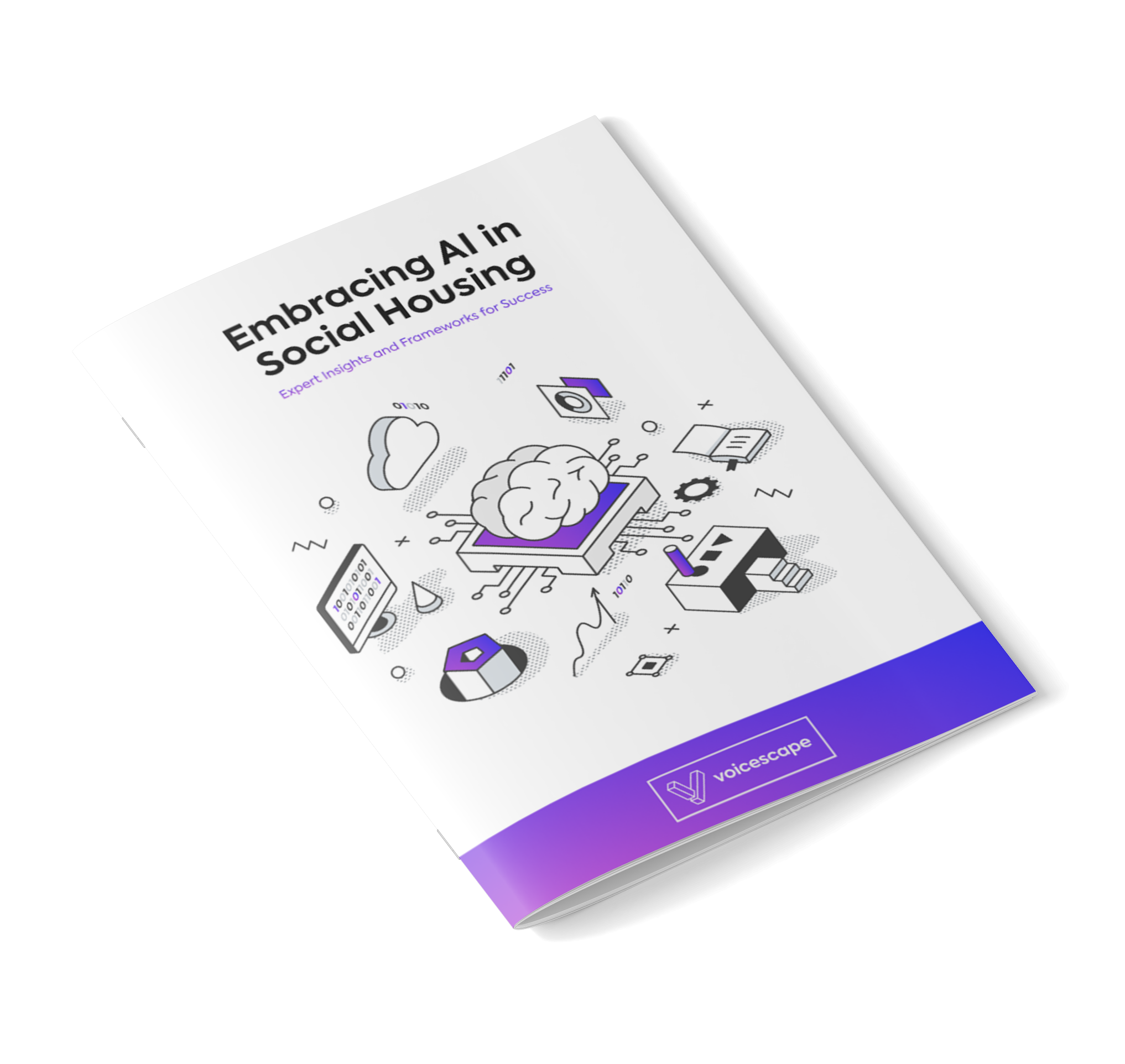When did AI really start to be something that was on the agenda for you?
I joined YHN just over two years ago. My background is local government policing and I joined social housing 2017; I think AI has always been there. It's something that’s really come to the fore now because there's such a strong emphasis on data and getting things right the first time.
As a sector I think we're quite behind the curve in terms of technology advancements and we've also got a significant issue and strategic risk in the quality of data. That's why I'm passionate about this, particularly as my background is in continuous improvement and my strength is in governance.
So I suppose it's that synergy between fast-evolving technology and making sure that we do things in the right way.
The foundations of AI are about data, because machine learning is fundamentally based on data. So it goes back to the fundamental principles of data protection. The seven principles of GDPR are: lawfulness, fairness, transparency, purpose limitation, data minimisation. With that last one in particular, that means only collecting the data for a purpose you need it for, as well as making sure it's accurate and that it's stored securely so it has integrity and confidentiality.
Also, I see myself first and foremost as a public servant.
In social housing, the customers trust us to provide service and they trust us with their data; so we have to be accountable. We have to undertake things like impact assessments and assess data protection to ensure that we have got a real grasp on the issues and the risks around privacy and integrity of data we hold on our tenants.
Has that changed your attitudes towards AI?
I see so many benefits from AI. First and foremost, it's something that can improve productivity in an organisation. It can drive down operating costs and improve outcomes for customers and communities.
I'm also very passionate about joining the dots up, having worked in local government, policing and housing. And this is an area in which AI can really help.
Sometimes we chase the target but we miss the bigger point because we do things in isolation. So we need to better join up the dots between organisations and data is the foundation for generating that rich picture of our communities. We need that to make very informed robust decisions about the critical issues and problems within communities, so that we can jointly problem solve and pool resources and budgets together for the good of the public purse.
So the benefits of AI are there but it's about balancing those business benefits with the ethical considerations, because there needs to be safeguards around that.
There are, for example, issues around cybersecurity and we’ve got to be very mindful of that. After all, we’re here to safeguard our most vulnerable customers.
How much do you think AI plays a role currently with your organisation compared to where you think it could go?
In terms of a maturity model, we're right at the start. We are very transactional and we're not transformational. But this is right across the social housing sector.
With data, we have a real issue in that we don't have a single version of the truth. As a sector, we have data stored all over the place and typically it isn’t structured right – it's stored in Teams, it's stored in emails, spreadsheets, and also just in people's heads. When those people leave, it’s a massive loss to the corporate membrane.
So, the opportunities are immense, but we've got to first accept that these are real issues that are happening right now. Our data is simply not in the best place currently, as a sector.
We've also got legal obligations with the Information Commissioner – we shouldn’t be collecting information if we're not doing anything with it. So, we need to be mindful of the legislation there is to safeguard organisations, staff and customers.
I talk passionately about the Nolan Principles (The Seven Principles of Public Life) - objectivity, honesty, transparency, accountability and leadership. And this comes into play a lot when looking at AI.
I view the Generative AI framework launched by Her Majesty's Government in January as an ideal framework for the sector. It outlines ten principles, and it is an iterative document because AI is moving at such a fast pace. It's a brilliant document and social housing providers need to bring it in as a terms of reference if they're looking at setting up an ethics committee or if they've got sponsorship boards in place (or, in fact, any other governance structure).
The principles are:
- Know what generative AI is and what its limitations are
- Use generative AI lawfully, ethically, and responsibly
- Know how to keep generative AI tools secure
- Have meaningful human control at the right stage
- Understand how to manage the full lifecycle of AI.
- Use the right tool for the right job
- Be open and you are collaborative
- Work with commercial colleagues from the start to understand what the opportunities are
- Ensure you have the skills and expertise you need to build and use generative AI
- Use these principles alongside your organisation's policies, and have the right assurances in place.
That for me is the terms of reference for the sector for ensuring good governance and keeping a grip on AI. It's not about reinventing the wheel.
Is the UK government doing a good job in providing governance and leadership?
Yes, from what I've seen and what's happening across the civil service, they're leading the way. They're mindful of what the issues are in terms of being joined up and in terms of what the issues are in society. They are focused on how AI can actually plug some of the issues.
That enables us at a local level to work more smartly together and provides a robust evidence base to make informed decisions.
What's holding the social housing sector up in terms of introducing AI as much as it could do?
I've got a number of points on this one. Firstly, a lack of understanding in terms of what the capability is. Also, organisations are up against it in terms of the financial backdrop - with any technology it’s about investing to save, that can be quite a scary decision.
Also the social housing sector is arguably not the best comparatively in terms of change management. So I think there's a gap in terms of change management capacity but also having a business case which everyone buys into outlining the strategic, financial, commercial and management case for delivering change across the organisation.
There is maybe a leadership mindset of being critical of past decision-making when in fact what we're trying to do is actually take corrective action. We have a scenario in social housing where there are often a variety of technologies that are driven by poor data and where the systems don't talk to one another.
From a customer point of view, all this does is lead to a bad and inefficient experience. Call waiting times are through the roof, for example. Customers are being frustrated because they end up waiting for 45 minutes, or they abandon the call, or they'll get through and they won't get a resolution at the first point.
It’s because the systems do not talk to one another and, as we know, ‘poor data in, poor data out’. As a sector, we've got no single view of our property stock and no single view of our customers. In effect, we don't have a single view of how our organisations work. That’s the issue.
IT in the sector can have that traditional kind of mindset "here's the solution, what's your problem?" but we need to spin that on its head and instead look at understanding what the problem is and what we’re trying to solve. That's when we should go out to the market and look at what the offer is to fix our problem.
Do you think there is a kind of a deliberate or a significant issue of misinformation in the sector?
I think we have too many strategies and when you've got too many strategies and too many targets, you end up chasing the target and missing the point.
So you need a very clear focus and clarity of purpose – what is it we are trying to do here as an organisation and what are our strategic priorities? How do we break that down into programs and projects so that they then are delivered and become business as usual?
It goes back to strong strategic direction and clear purpose, where everyone in the organisation knows their role in delivering that vision. So it's about creating a strong and clear narrative, backed up by good communication and bold leadership.
When you talk about the different issues and things you want to resolve, do you think AI will have a role in all of those elements and bringing it all together?
It’s about going back to that problem we're trying to solve. When you understand what the problem is you're trying to fix, that's when you need to engage with the market and that's when you engage with colleagues within the social housing sector.
That's when you should actually look outside of the box as well. Don’t just look within social housing, because we're not at the forefront and we don't lead the agenda here. Other sectors have gone further and we need to look outside and bring that learning back in.
So for me, it's really about understanding what is out there and how that can be applied, then having the budget to deliver. We also need to assess the benefits any solution brings. And by that I don't just mean you return on your investment, but also tracking how a solution has improved a customer journey or customer satisfaction or the experience of your staff.
There are always significant risks in introducing new major solutions. If you can bypass the risks and the issues through exploring the lessons learnt by others, that brings a cost saving to your organisation.
So for example, the AI framework that the Government has produced will save a lot of money, a lot of time and a lot of risk. If someone's done a lot of the legwork for you and is bringing best practice to you, use it.
Where should you draw the line in terms of areas that AI shouldn't touch within social housing?
I wouldn’t make that decision. It goes back to that informed basis. When you build a robust business case, you create a real understanding of the problem and the associated intricacies, but you do that using tools like data protection impact assessments to find a solution that works within the context of the principles of GDPR.
So use those tools and then make an informed decision. That will guide you on where the line is.
Do you think there’s enough guidance and regulation or do you think we need more?
My view is, actually, we don't need to reinvent the wheel. The social housing regulator doesn't need to come up with a piece of regulation on AI because we've already got it. However, the mindset for some in the sector is it needs to come from the social housing regulator.
So, if the social housing regulator wants to rebrand the government's framework, let them do it if that satisfies the need. It's a quick win.
Across the public sector, there's been a history of bad decision making when it comes to IT. And it goes back to having devolved responsibilities where departments are going off and doing their own thing. There's been no centralisation and alignment around the overall vision of organisations. That has been a fundamental issue across the public sector.
Instead, an organisation needs a collaborative roadmap which is shared across the business rather than a standalone process within Department A and Department B. It’s about that collaborative approach across the organisation and collaborative problem solving.
To what degree do you think you should inform stakeholders and involve stakeholders in the process of introducing AI? In particular, customers?
It’s all about hearts and minds. Whether you're talking to a senior leadership team, the frontline staff, or customers, you have to sell AI in terms of benefits and incentives it brings.
If, from a customer point of view, there is an incentive for them to use an application on their phone at a time and place of their choosing, rather than the inconvenience of a contact centre that might only be open from 9 to 5, that's an incentive. So it's about selling the benefits and incentives, because we love incentives. AI has always been there; it’s just we haven't caught up with what the technology has to offer.
Do you have any regrets in terms of introducing AI to your organisation to date?
The only regret I have is not all being on the same page in terms of what the capabilities are and what the benefits are. It goes back to leadership, to governance, and to getting the narrative right. We have put really good foundations in place at YHN, but it's a case of building on those foundations.
If this is something you would like to read more about, download the full FREE whitepaper here.
Get in touch?
Want to see how Voicescape technology could help your housing association? Get in touch






